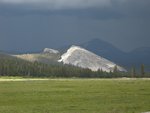ScienceDaily (July 14, 2011) — The enormous decline of large, apex predators and "consumers" ranging from wolves to lions, sharks and sea otters may represent the most powerful impacts humans have ever had on Earth's ecosystems, a group of 24 researchers concluded in a new report in the journal Science. The decline of such species around the world is much greater than previously understood and now affects many other ecological processes through what scientists call "trophic cascades," in which the loss of "top down" predation severely disrupts many other plant and animal species.
http://www.sciencedaily.com/releases/2011/07/110714142135.htm
Home
>
General Discussion
>
Topic
Re: Loss of Large Predators Disrupting Multiple Plant, Animal and Human Ecosystems
All posts are those of the individual authors and the owner
of this site does not endorse them. Content should be considered opinion
and not fact until verified independently.
July 14, 2011 04:43PM | Admin Registered: 16 years ago Posts: 17,152 |
July 15, 2011 01:11PM | Moderator Registered: 16 years ago Posts: 1,942 |
I have not been able to find the original study, but the implication from the news reports is that large predators have an unappreciated effect throughout ecosystems and possibly the threated extinction of smaller creatures/plants can be attributed in many instances to lack of large predators at a different point in the ecosystem. Makes one wonder what large predator deficiency could be linked to pika numbers. Apparently, to fully understand threatened species recovery, one has to understand the entire ecosystem. On the dark side, it suggests that the role of humans in reducing large predators is magnified throughout the ecosystem with complex and compounded effects beyond the individual large species harvested.
July 15, 2011 04:27PM | Registered: 16 years ago Posts: 4,174 |
If the scientist can fully understand the role of the large predator on a their eco-system, maybe people can mimic the behavior of the large predators that is beneficial to their ecosystem. But to do that successfully without a slew of unintended negative consequences, more research needs to be done to fully understand the role and impact that large predators had on their ecosystem.
Of course the ideal solution would be to try to restore the population of large predators to close to their historical average. But in many parts of the world that might not be possible because of the loss of their prime habitat to development.
One wonders what negative consequences did the extinction of the California Grizzly had on the ecosystem of the valleys and foothills that were their prime habitat.
Of course the ideal solution would be to try to restore the population of large predators to close to their historical average. But in many parts of the world that might not be possible because of the loss of their prime habitat to development.
One wonders what negative consequences did the extinction of the California Grizzly had on the ecosystem of the valleys and foothills that were their prime habitat.
July 15, 2011 05:53PM | Moderator Registered: 16 years ago Posts: 1,876 |
Quote
Frank Furter
I have not been able to find the original study, but the implication from the news reports is that large predators have an unappreciated effect throughout ecosystems and possibly the threated extinction of smaller creatures/plants can be attributed in many instances to lack of large predators at a different point in the ecosystem. Makes one wonder what large predator deficiency could be linked to pika numbers. Apparently, to fully understand threatened species recovery, one has to understand the entire ecosystem. On the dark side, it suggests that the role of humans in reducing large predators is magnified throughout the ecosystem with complex and compounded effects beyond the individual large species harvested.
Dear Dawg,
The "Science" article is not listed/available here yet, but browsing around this webpage, and the rest of the OSU Trophic Cascades Program website, should provide plenty of information:
http://www.cof.orst.edu/cascades/articles.php
(BurrowingThroughTheStacksies-ly Yours)
The Marmots
P.S. Let us know if you really want a copy of the "Science" article, we might be able to download a PDF copy from the UC library system.
Sorry, only registered users may post in this forum.


